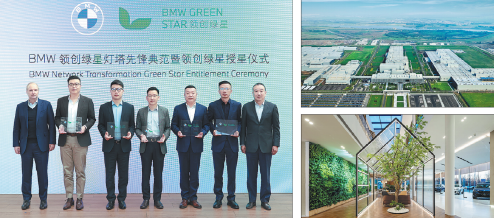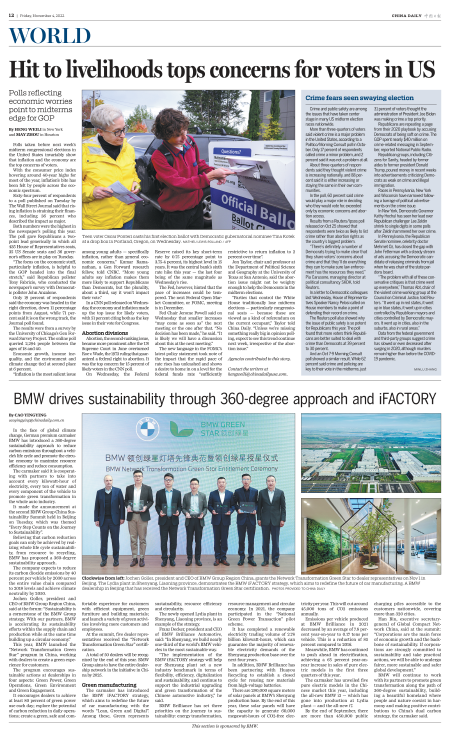
Clockwise from left: Jochen Goller, president and CEO of BMW Group Region China, grants the Network Transformation Green Star to dealer representatives on Nov 1 in Beijing. The Lydia plant in Shenyang, Liaoning province, demonstrates the BMW iFACTORY strategy, which aims to redefine the future of car manufacturing. A BMW dealership in Beijing that has received the Network Transformation Green Star certification.
In the face of global climate change, German premium carmaker BMW has introduced a 360-degree sustainability approach to reduce carbon emissions throughout a vehicle's life cycle and promote the circular economy to maximize resource efficiency and reduce consumption.
The carmaker said it is cooperating with partners to take into account every kilowatt-hour of electricity, every ton of water and every component of the vehicle to promote green transformation in the whole auto industry.
It made the announcement at the second BMW Group China Sustainability Summit held in Beijing on Tuesday, which was themed "Every Step Counts on the Journey to Sustainability".
Believing that carbon reduction goals can only be achieved by realizing whole life cycle sustainability, from resource to recycling, BMW has proposed a 360-degree sustainability approach.
The company expects to reduce its carbon dioxide emissions by 40 percent per vehicle by 2030 across the entire value chain compared to 2019 levels and achieve climate neutrality by 2050.
Jochen Goller, president and CEO of BMW Group Region China, said at the forum: "Sustainability is a cornerstone of the BMW Group strategy. With our partners, BMW is accelerating its sustainability efforts within the supply chain and production while at the same time building up a circular economy."
This year, BMW launched the "Network Transformation Green Star" program in China, working with dealers to create a green experience for customers.
The program encourages sustainable actions at dealerships in four aspects: Green Power, Green Operations, Green Environment and Green Engagement.
It encourages dealers to achieve at least 80 percent of green power use each day; explore the potential of carbon reduction in daily operations; create a green, safe and comfortable experience for customers with efficient equipment, green furniture and building materials; and launch a variety of green activities involving more customers and employees.
At the summit, five dealer representatives received the "Network Transformation Green Star" certification.
A total of 50 dealers will be recognized by the end of this year. BMW Group aims to have the entire dealership network in the initiative in China by 2025.
Green manufacturing
The carmaker has introduced the BMW iFACTORY strategy, which aims to redefine the future of car manufacturing with the words "Lean, Green and Digital".Among these, Green represents sustainability, resource efficiency and circularity.
The newly opened Lydia plant in Shenyang, Liaoning province, is an example of the strategy.
Franz Decker, president and CEO of BMW Brilliance Automotive, said: "In Shenyang, we build nearly one-third of the world's BMW vehicles in the most sustainable way.
"The implementation of the BMW iFACTORY strategy will help our Shenyang plant set a new industry benchmark in terms of flexibility, efficiency, digitalization and sustainability, and continue to support the industrial upgrading and green transformation of the Chinese automotive industry," he said.
BMW Brilliance has set three priorities on the journey to sustainability: energy transformation, resource management and circular economy. In 2021, the company participated in the "National Green Power Transaction" pilot scheme.
It has completed a renewable electricity trading volume of 2.78 billion kilowatt-hours, which can guarantee the majority of renewable electricity demands of the Shenyang production base over the next four years.
In addition, BMW Brilliance has been partnering with Huayou Recycling to establish a closed cycle for reusing raw materials from high-voltage batteries.
There are 290,000 square meters of solar panels at BMW's Shenyang production base. By the end of this year, these solar panels will have the capacity to generate 60,000 megawatt-hours of CO2-free electricity per year. This will cut around 45,000 tons of CO2 emissions annually.
Emissions per vehicle produced at BMW Brilliance in 2021 decreased by an average of 7.8 percent year-on-year to 0.17 tons per vehicle. This is a reduction of 85 percent compared to 2016.
Meanwhile, BMW has continued to push ahead in electrification, achieving a 65 percent year-on-year increase in sales of pure electric models in the first three quarters of this year.
The carmaker has unveiled five pure electric models in the Chinese market this year, including the all-new BMW i3 — which has gone into production at Lydia plant — and the all-new i7.
By the end of September, there are more than 450,000 public charging piles accessible to the customers nationwide, covering more than 320 cities.
Han Bin, executive secretary-general of Global Compact Network China, said at the summit: "Corporations are the main force of economic growth and the backbone of sustainability. If corporations are strongly committed to sustainability and take practical actions, we will be able to undergo fairer, more sustainable and safer global development."
BMW will continue to work with its partners to promote green transformation along the path of 360-degree sustainability, building a beautiful homeland where people and nature coexist in harmony and making positive contributions to China's dual carbon strategy, the carmaker said.
caoyingying@chinadaily.com.cn

